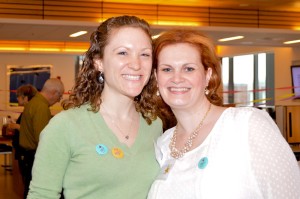By Carolyn Ridge
On June 1, 2012, at the age of 30, I was diagnosed with stage IV ovarian cancer. The physical toll cancer took on my body was difficult, forcing me into early menopause, but I was even less prepared for the emotional side effects cancer would bring, including the depression I experienced throughout treatment.
I am now dealing with a recurrence that was diagnosed in September 2014, but my reaction this time is different, because I am different. I have a care team I trust, cancer tools at my disposal, and, most importantly, I know that I’m not alone. Here are some of the lessons I learned on my cancer journey:

Talk openly and honestly with your care team.
Being 30 and going through menopause was a situation I was completely unprepared for. I couldn’t talk to my friends in their 20s and 30s, and talking to my mom or someone older was embarrassing. I had to find a way to speak with my doctors about what I was feeling physically and emotionally. Although some topics can be difficult to talk about, the only way your care team can help is if you’re honest about what’s going on. Find a communication style you’re comfortable with – phone, email, or handing written questions to your doctor are all possibilities.
Both allow and manage your anxiety.
There are certain times when you experience anxiety about scans, procedures, or things happening in everyday life. This is normal. Anxiety can pop up when you least expect it, or it can occur for periods of time, but there are ways to cope with it. Exercise, creative expression, or talking with a friend or therapist can help you cope. The more power you give your anxiety, the more power it has.
Be intentional about what you share.
Most cancer patients have probably had a moment where they’ve wanted to say, “I can’t believe you just asked me that.” You don’t need to share any information that makes you uncomfortable, and you don’t need to feel guilty about not answering a question. There may be days when you feel like sharing, and days when you don’t. I’ve found having certain phrases ready has helped me deal with being caught off-guard. These include: “Today is a good day, thanks for asking” and “My doctors are taking excellent care of me, and I’m taking things one day at a time.”
Read more:
Take care of yourself first.
I dealt with many different reactions from friends and family after telling them about my cancer. In certain situations, I found myself apologizing for the news and feeling like I had done something wrong. Working with my therapists, I learned I had to start taking care of myself first. Once I learned coping mechanisms for my own feelings, I was able to better handle other’s reactions to my cancer. Now, my feelings and my thoughts will always be what I focus on first.
Asking for help is a sign of strength.
When I was first diagnosed with depression and needed to see a therapist, I saw this as a sign of failure. But reaching for help from a friend, family member, or professional is never a sign of weakness. Asking for help is just another way of taking care of yourself.
Focus on who you are today.
In the beginning, I often found myself looking back on the woman I used to be. I wished I could have my independence, hair, and scar-free body back. Now, I no longer think of myself before and after cancer; I simply focus on me. Try to keep your attention on what’s going on in your life today and who you are at this moment. It can be difficult getting to know yourself again, but I’m pretty sure that once you do, you’ll find that you are amazing. Cancer does not define you; it is only a part of your journey.
View Carolyn’s full keynote address from the 2015 Young Adult Cancer Conference and learn more about Dana-Farber’s Young Adult Program.

Thank you for sharing this…
I’m a stage 4 breast cancer fighter. My mother was diagnosed with lung cancer after me, but passed on Mother’s Day. I spent well over a year not sure what I wanted, to live or die. I realized my children are still here, and even though two of them are grown, they still need me around. I also realized that for over 40 years, I never lived, just existed. I choose life. There is so much I want to do, and see. I want to spend time with my grandchildren when they come. I want to help as many people as possible. I used to feel guilty asking for help, so I just didnt! Now I know asking for help is a sign of strength. I pray God’s healing on you, from head to toe. Many more years of joy, happiness, and good health.